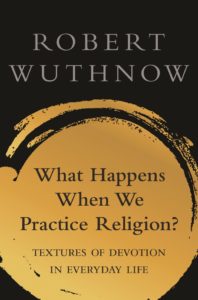 Textures of Devotion in Everyday Life
Textures of Devotion in Everyday Life
Throughout the past few decades, the study of religion has shifted away from essentialist arguments that claim to explain what religion is and why it exists. It is commonly viewed as something that people practice, whether in the presence of others or alone. But what is meant by “practice”? What Happens When We Practice Religion?, by Robert Wuthrow, delves into the central concepts, arguments, and tools that can be used to explore and understand religion today.
Recently, scholars have begun to move away from trying to understand the philosophy of religion. Using methods from anthropology, psychology, religious studies, and sociology, they now focus on what people do and say: their daily religious habits, routines, improvisations, and adaptations. In this book, Wuthnow shows how four intersecting areas of inquiry—situations, intentions, feelings, and bodies—shed important light on religious practice in the modern world.
Reviews and endorsements of the publication include:
“With his characteristic insight and erudition, Robert Wuthnow has produced another gem of a book. What Happens When We Practice Religion? is a broad-ranging and generous text, distilling several generations’ worth of social scientific work on the paradigms of practice that will engage newcomers and old-timers alike.”—Matthew Engelke, Columbia University
“This highly interdisciplinary book offers an integrated theoretical framework and a set of research tools for probing religious practice more deeply. Robert Wuthnow weaves together a vast amount of literature that clearly and effectively advances his arguments.”—Ann Taves, University of California, Santa Barbara
For more information on the publication, click here.
Fellow travelers are scholars, activists, and practitioners that embody the ideals and commitments of the Project on Lived Theology. We admire their work and are grateful to be walking alongside them in the development and dissemination of Lived Theology.
